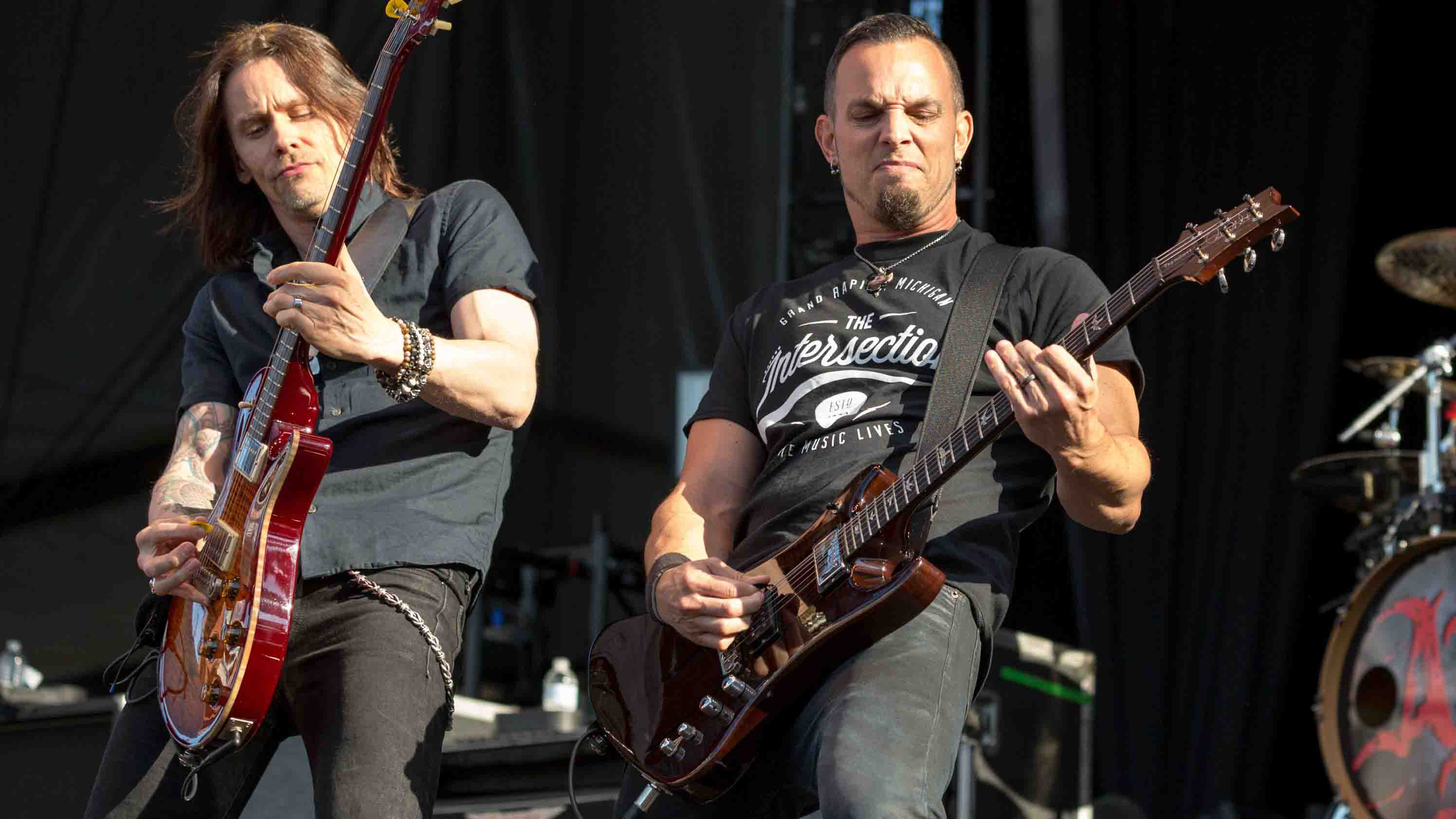
Piecing it all together
With The Last Hero being Mark Tremonti’s third album in 18 months - after two releases with his solo band - the prolific songwriter could be forgiven for running out of steam. But whenever he meets with his Alter Bridge bandmate Myles Kennedy, there’s an embarrassment of riches between them when it comes to ideas.
“That’s how things are different in Alter Bridge in any other bands I’ve been in before,” he tells us, “because we both come to table with complete parts of music and melody. Then we piece our ideas together.”
Their unusual jigsaw method has reaped incredible results on five albums over 12 years of collaboration for the band, which is taking them all the way to the O2 Arena on this year’s UK tour.
As songwriters, their synergy is now at the point where they’re finishing each other’s sentences…
“We’re both big melody guys, and when Myles and I get together we’ll both spit ideas at one another,” Mark explains.
“I’ll say I’ve got this chorus that starts out with ‘Show me a leader that – blank – ’ and he finishes it off. So a lot of the lyrical vision is Myles’s, but I contribute a lot on melodies. Sometimes I’ll split out one line that he’ll chase down and finish off; sometimes he comes up with the part melody-wise and part-wise.”
“We’re both very driven and both work very hard,” adds Myles.
“I think because we’ve worked together for so long we’ve seen how this partnership has been very effective and we trust each other now.”
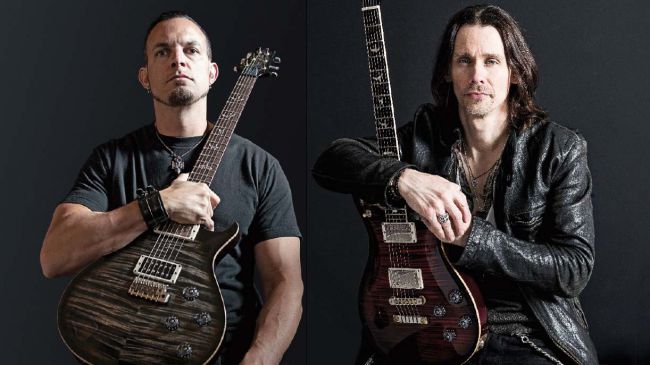
As guitarists, this mutual creative support is seeing both players hitting new form on The Last Hero.
Tremonti turns in his finest all-round performance yet as a soloist across an album, while Kennedy is showing more of his fusion roots than ever before in the band - which will come as a big surprise to anyone who only knows him as the man who sings with Slash.
“He’s doing more and more soloing,” praises Mark.
“And from day one, ever since I heard how good a guitar player he was, I’ve been really pushing him to do more of this, because it would be a damned shame as good as he is not to showcase that talent.”
We sat down with Mark and Myles to talk through every track on The Last Hero in detail (even the bonus tracks) to find out how they worked as a partnership to evolve their sound and raise their bar as players.
Don't Miss
Mark Tremonti: the 14 records that changed my life
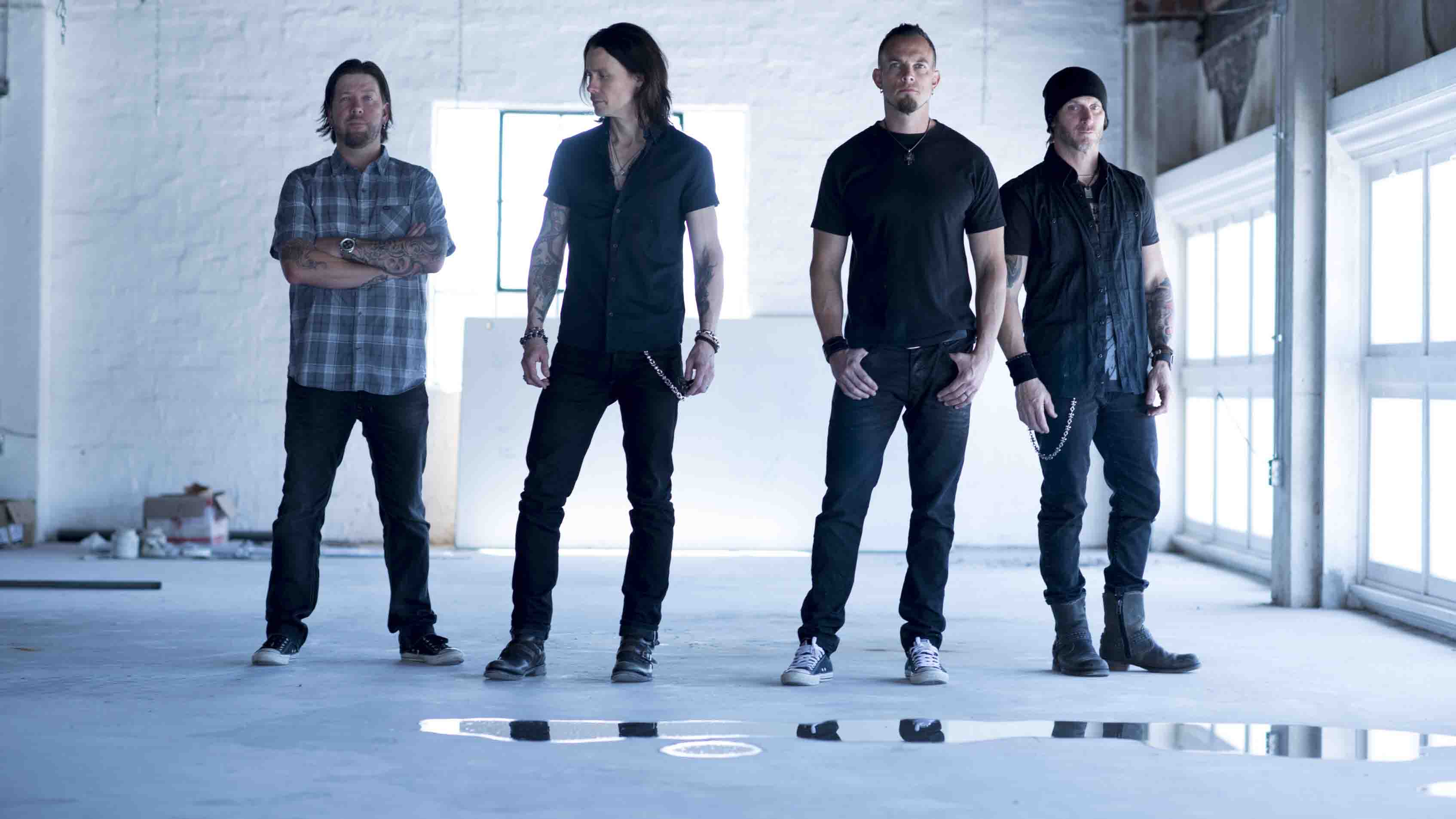
1. Show Me A Leader
Mark: “I remember getting on the phone with Myles, and as usual we have this discussion where we have to decide how we’re going to make this record a little different than what we’ve done in the past, keep on developing and going deeper into the rabbit hole.
“I said that one thing I want to do is try to incorporate a seven-string, because it’s never been my thing and it’s never been something that has really inspired me that much. But I wanted to break it back out and see if I could find some inspiration there.
“Then Myles showed me his part of the intro for Show Me A Leader and I started playing the seven-string over it. It just added so much depth. Such a big low-end and something we haven’t had… we’ve had drop B stuff but this was even heavier-sounding… deeper-sounding.”
Myles: “I had written the intro, and then Mark had the chorus and we built the rest of the song around that. I think we’d had that intro with another song at one point and then we changed it.
Within a day... we decided to get the version out with the intro, because it was losing something to some of the fans
“In fact, it was kind of controversial when we put the song out initially and we did the edit. We didn’t know if it was going to work, and within a day Brian [Marshall] our bass player had read some comments and we decided to get the version out with the intro, because it was losing something to some of the fans. It seemed to help and we almost did the video version without the intro, but fortunately the fans helped us decide that one, real quick.”
Mark: “I think that song without the intro is a decent song, but that intro makes it a great song. I think I started riffing on the verse in the moment; I don’t think it was a part that existed at all before we tried to fit that chorus and intro together. I just started playing on it and Myles threw the melody down.
“I think the same happened with the bridge. I don’t think that bridge existed until we sat down that night to put it together. It was really built on that intro and that chorus. Myles had a lot of the intro worked out and then the seven-string over the top filled it out so nicely. I think that intro is still one of my favourite parts on the record.”

2. The Writing On The Wall
Myles: “It’s about the global warming denying phenomenon that is taking place. That song in particular has a very passionate vocal; that’s definitely one of my favourite songs, and I’m sure we’ll play that in the set. The chorus came from me, as well as the Mastodon-inspired middle part.
“Travelling is a massive component for me [with songwriting] - in fact, a lot of the music that I brought in that made it to the record was written when I was travelling in India last year with Slash. India was a hotbed of creativity for me. I almost couldn’t shut it off at times. The things I was seeing, the cacophony of sounds – street noise and people. It was heavy, man. It was good.
“The chorus happened one day and it was either at the hotel or on the streets of Mumbai. And that riff is Mark’s, and it’s one of of my two favourite riffs on the record by him; it’s just awesome.”
Mark: “Me and Myles always get together at my place before we go over to pre-production, and that was one we were both excited about. It came together nicely, and we couldn’t wait to bring it to pre-production. It was one of those things that as soon as we played it for everybody they said, ‘That’s killer’ and there was never any doubt in anyone’s mind that was going to be a song that made the record.”
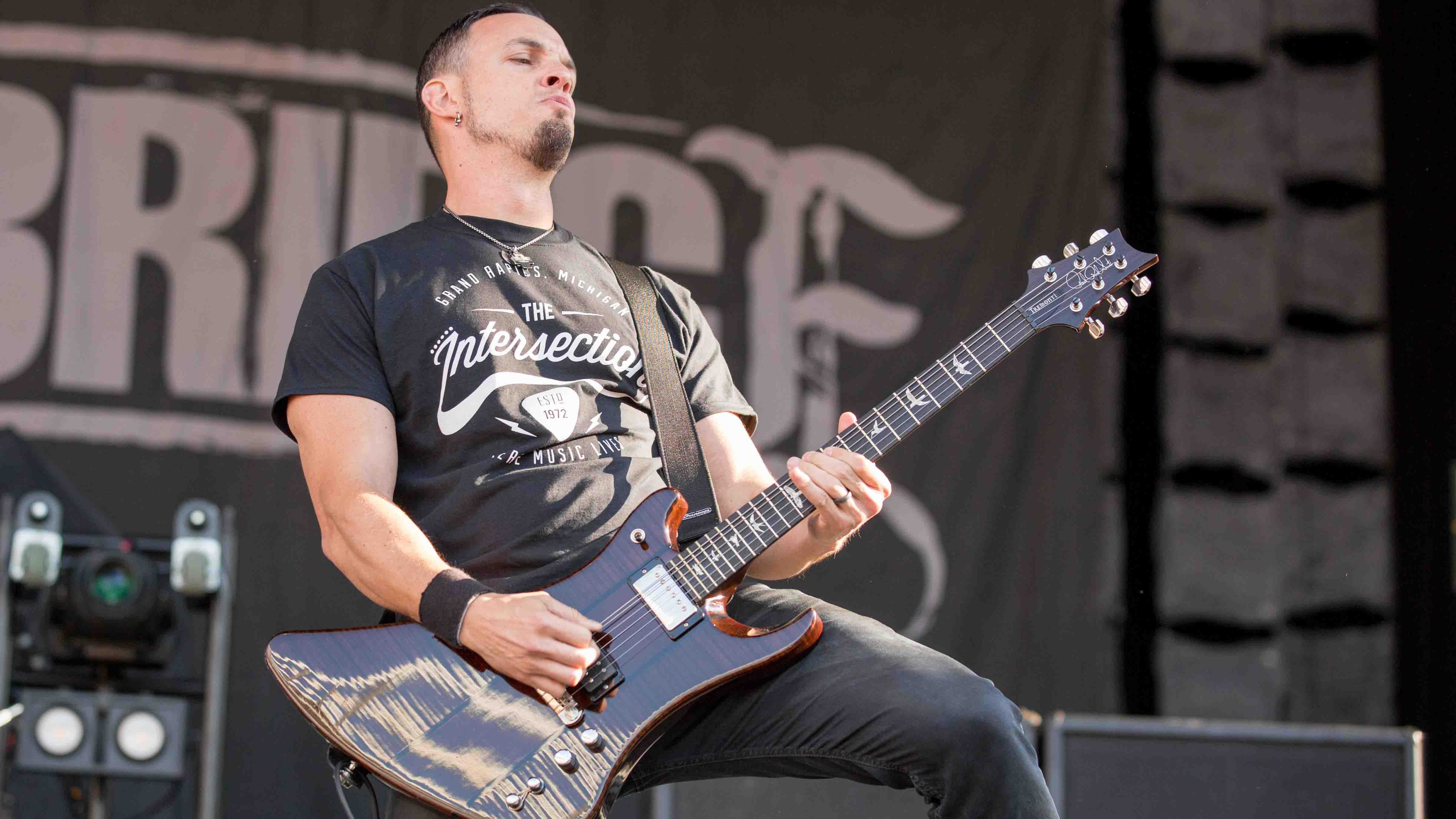
3. The Other Side
Mark: “That’s in drop B. [Producer Michael 'Elvis' Baskette] Elvis was hellbent on having a swing song, something with a big heavy swing to it. He referenced one of our songs from ABIII and he wanted this heavy groove swing song. So I’d go home every night and I’d try to come up with the riff then present my favourite.
“I came up with the riff in that process. It doesn’t really have a swing to it, but when I was in that mode of trying to riff out on stuff I stumbled on that and I knew I really wanted to make it happen as it was one of my favourite ideas. It’s probably my favourite track on the whole record.”
Myles: “It’s open to interpretation. People have all sorts of theories about what that is about, but to me it’s ultimately about anyone who is trying to find salvation or redemption through means that are not necessarily healthy or good.
Every time I hear it, I still think of it the way it was originally written. Which was real doom-rock, and now it’s so sped up
“Musically, once again, this was Mark’s riff and it’s just beyond heavy, and I think that’s going to be another great one live. The intro riff is something I had come up with last year on the road and it used to be so much slower. So every time I hear it, I still think of it the way it was originally written. Which was real doom-rock, and now it’s so sped up. But that’s one of those things, when you get together with people and write you have to hand it over and trust.
“I love that chorus riff, too - Mark came up with that real quick when we were trying to find a chorus for it. Elvis and Mark were talking and then Mark just started playing that riff. That was really special.
Mark: “That happened in the moment. We were sitting in pre-production and I was playing that progression. All the guys were pretty much, ‘Yeah, keep going with it - that’s killer’ and it just happened. It just seemed to flow perfectly.
“I was always on the fence when you’re in drop B tuning - the drop B tuning we use where it’s just the bottom string tuned to B - about playing a powerchord shape on the low two strings. Sometimes it works, sometimes it doesn’t. But in this case it worked really well. I was really happy with the way that one turned out.”
Myles: “The guitars in the middle eight were something I put over the top with that dissonance and the half-step bend thing. For me, that section really reminds me of Massive Attack.”
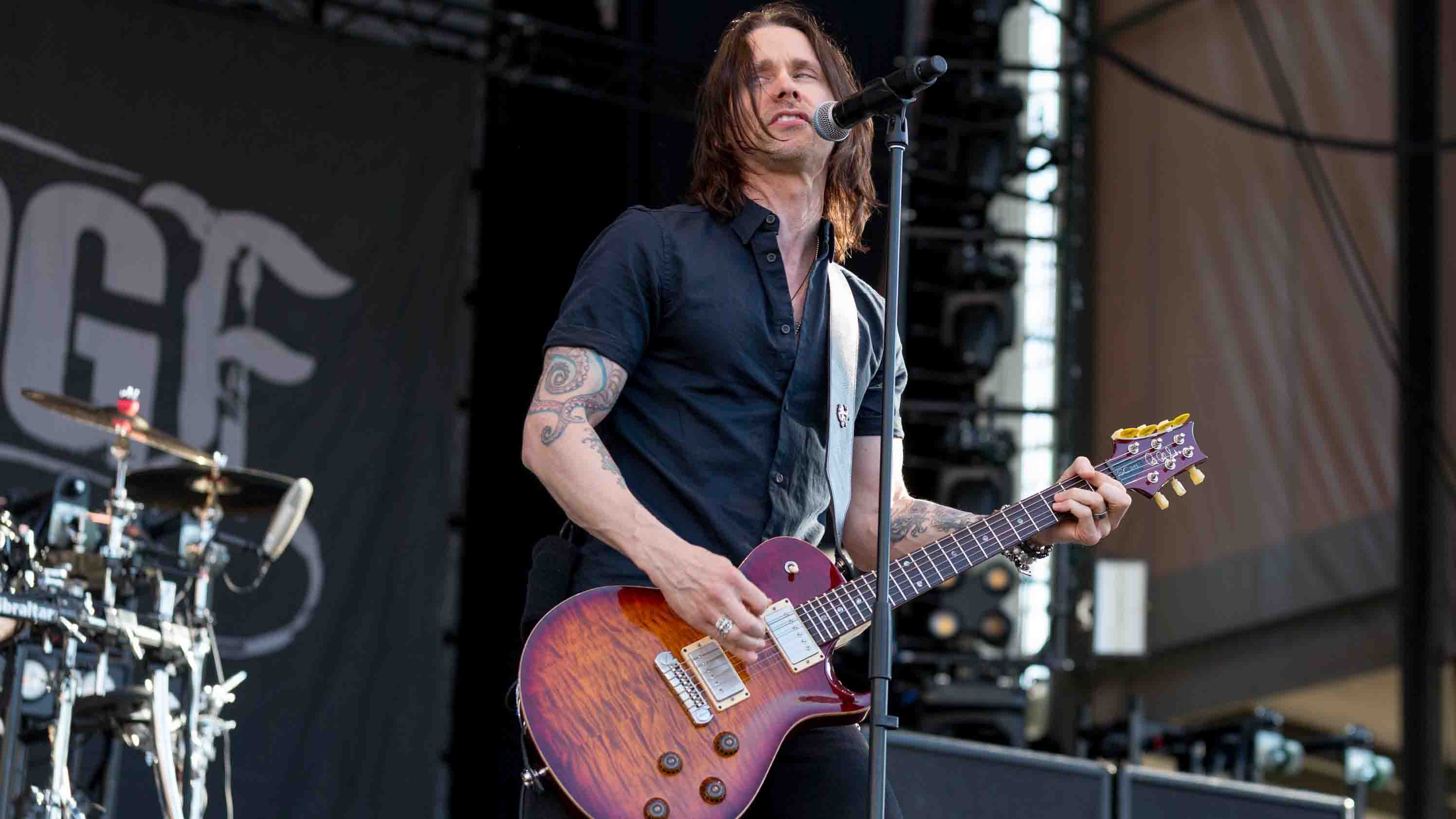
4. My Champion
Myles: “That’s a Mark riff, and the first time he played that for me was on acoustic guitar. And hearing it in an acoustic setting totally changes the vibe of it usually - it’s not as anthemic. But that is such a super-strong hook, no matter what you hear it on.”
Mark: “That’s a new tuning for this record. It’s half-step down and the low string is tuned to C (but it's a B when down).
“I came across that tuning when I was jamming with John Connolly from Sevendust. He had said that was one of his favourite tunings, and I thought that was crazy because it's a half-step off of my comfort spot with the drop B tuning. So when I tried it I thought it was strange until I really figured out how cool it was.
“I really liked that riff, because I could use a lot of the open strings and it had kind of a '70s vibe that I dug. When it comes to writing sessions, you have a few parts you set aside for one of the first things you really want to make happen on the record, and that was one of my most memorable riffs that I really wanted to see happen.
Myles: The chorus reminds you of Steve Perry? That’s cool, we love the Steve Perry and the Journey!
“From a melody standpoint, I probably spent the most time fine-tuning that one. It was probably the last thing I finished melodically and lyrically because I knew that was such a special hook that he had guitar-wise. I didn’t want to take away from that at all so we’re real happy it turned out the way it did.”
Mark: “I think my whole influence is a mixture of speed metal and '70s and '80s soft-rock. I love melodic stuff and brutal heavy stuff.”
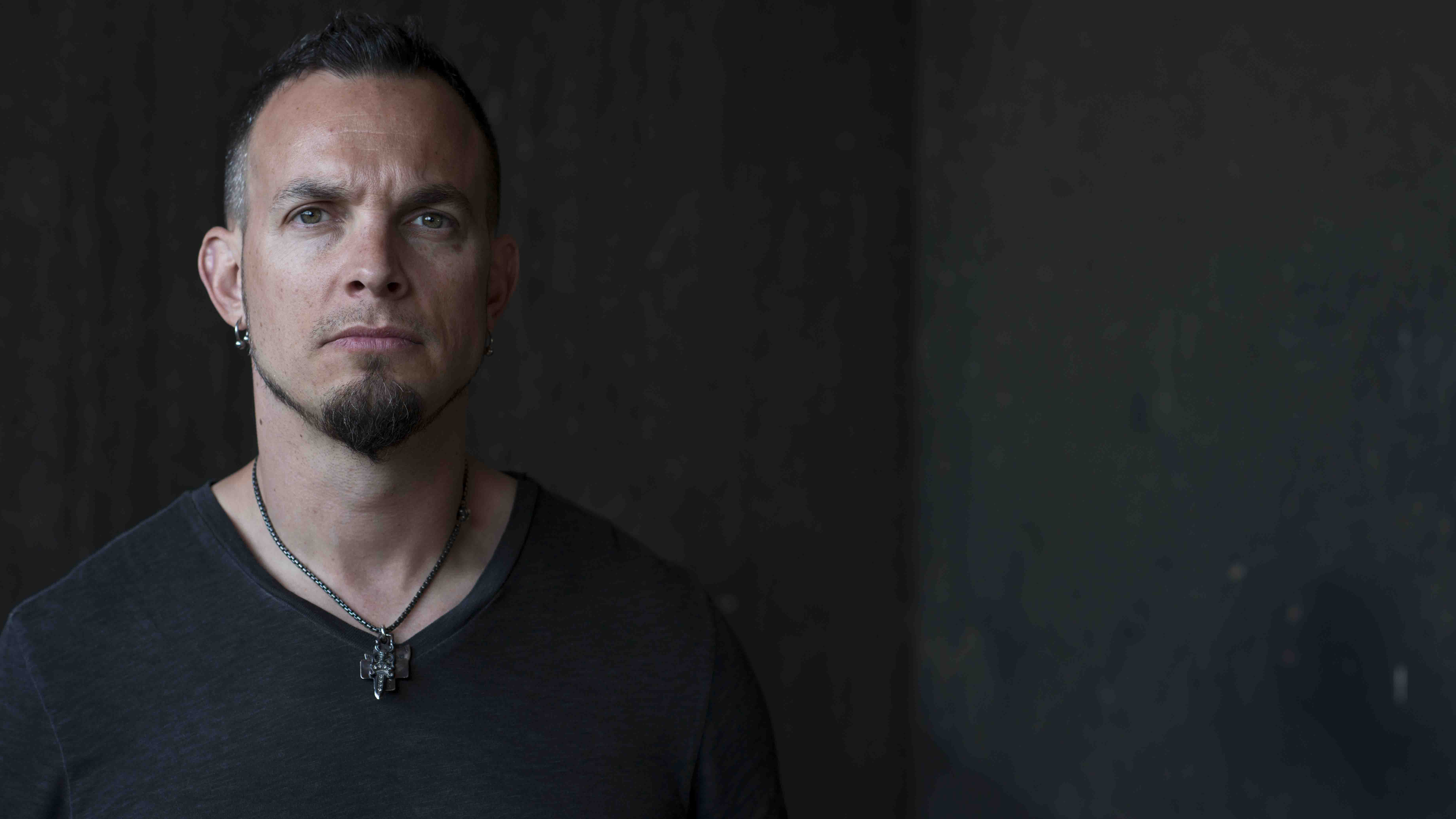
5. Poison In Your Veins
Myles: “That’s a Mark chorus. He’s really got a good arena sense - that arena-rock hook. The synth is from Elvis; he adds those kind of things. Neither Mark or I are much into [playing] synths, but Elvis likes to tuck those into his mixes.”
Mark: “I just like a chorus that explodes, that has this bigness to it. A chorus should be that big energetic part that you want to keep coming back to. That was one of the choruses that I really loved for this album, and in pre-production I had to keep on pulling that thing out.
“And it didn’t work in the first couple of songs. Elvis kept on shooting it down in the first few arrangements we had and I just kept on pulling it out there: ‘Come on, let’s try it again’ and finally it went from a part that I was struggling to get into to an, ‘Okay, this could be the first single’ kind of thing.
“I think it’s when I pulled out the verse riff that everyone loved; I think that’s when everyone fell in love with the combination of the verse and chorus. That verse riff is what really sparked it for Elvis and I really didn’t want to waste that chorus.
“Elvis isn’t like that all the time, just every now and then. And when it’s an idea you really love, it can get frustrating because you respect each other so much, if he’s saying something about a part that’s one of your favourites, I know now I have to really work hard to show everybody that this part deserves to make it on the record.
“I think Myles always loved the chorus, and the other guys loved it, but I think the earlier songs we placed around it didn’t have the same vibe and it kind of had a hokier sound to it. This sits better with what he have now.
The first time [our producer Elvis] ever said when I’ve been working with him that I shouldn’t do a solo a certain way was on that song
“Speaking of Elvis and his input on the record, I had written a solo for that song, and the first time he’s ever said when I’ve been working with him that I shouldn’t do a solo a certain way was on that song. He was like, ‘I just don’t like the way the solo starts; it sounds like the ending.’ I responded, ‘Really?! I love the way it starts!’
“But once somebody says that, it will always be in the back of your mind, so I went and redid the intro. He said, ‘It’s just the intro; everything else I love.’ But there’s a part that happens in the middle of that solo that used to be at the start of the solo, but in a lower octave. There’s a repeating theme and he didn’t like that [being played at the start] because he thought it was an answer to something else. So I started the solo with a more obvious intro part, and he loved it.
“One thing I’m happy about is the old way it was written was really tough to play with these big bends that ran across the neck and you had to land on the quickly and bend precisely on. It was one of those things that maybe once in every five times you play it you’ll mess it up, so it’s much easier now.”
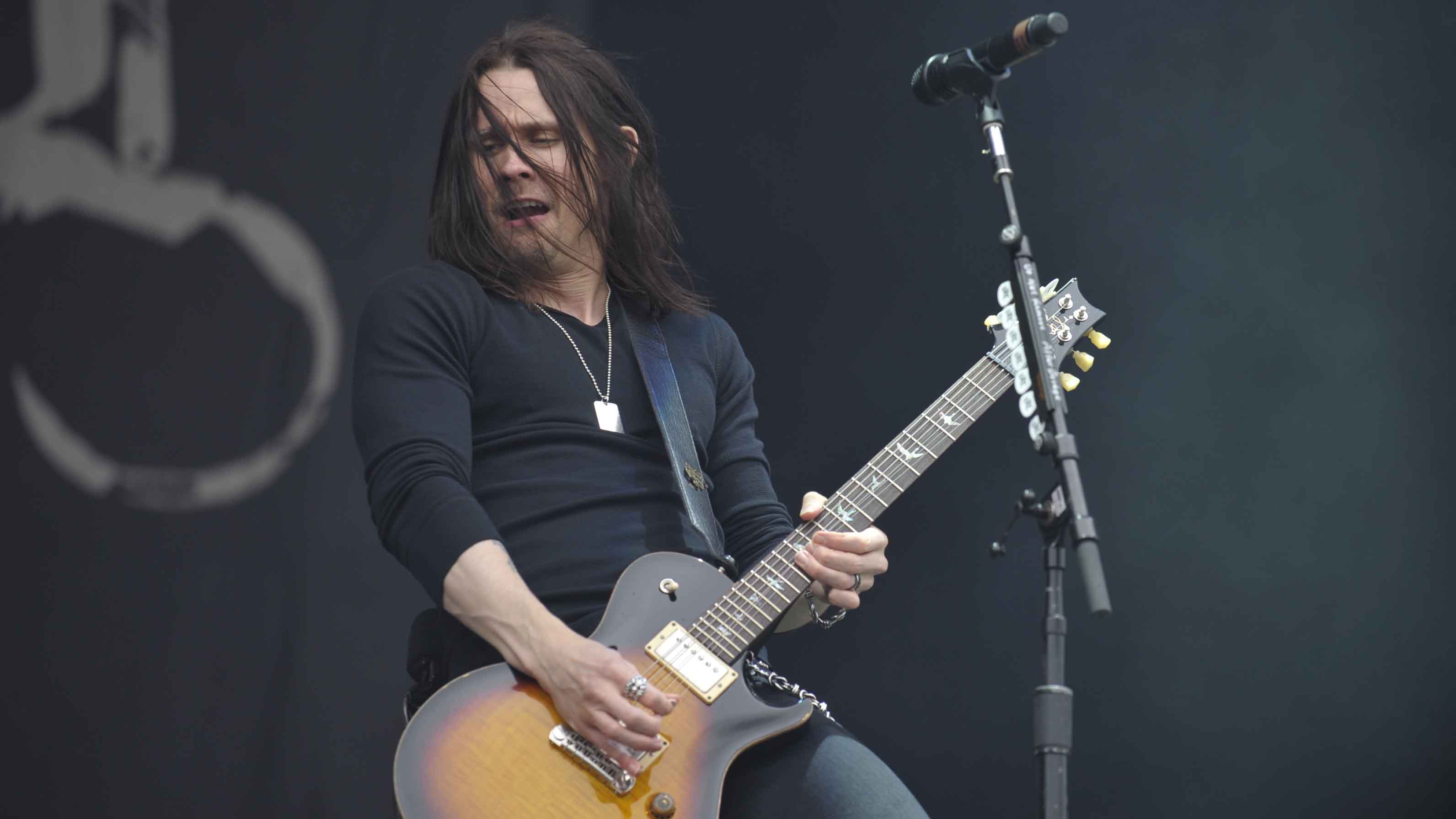
6. Cradle To The Grave
Myles: “Musically, the verses came from me and the main riff came from Mark. It’s a heavy song lyrically and was written right after my mother-in-law had fallen ill, and it essentially deals with the idea that our parents aren’t going to be around forever and the emotions tied in with that.
My mother-in-law passed away literally two weeks prior to recording that, and it was pretty hard getting through it
“My mother-in-law passed away literally two weeks prior to recording that, and it was pretty hard getting through it. My wife can’t even listen to that song; it’s tough.”
Mark: “The riff was one of my favourites that I played for Myles. We built the song on that riff, and then Myles had the verse part ready and then I wrote the heavy bridge riff - that was a riff that happened in the moment and I just kind of stumbled on it.
“Those are the kind of moments that make you want to do what you do. When something happens in the moment like that… it’s one thing when you log an idea for months and you can’t wait to get it out there, but when you’re in the moment and you’re making that final demo for the record and it happens right there it’s a great feeling.
“That’s one I’m really looking forward to playing live. That’s always been one of my favourites. It feels like an album track to me - it’s never going to be a single or anything - but it’s definitely one that I think a lot of fans will gravitate towards once they’ve really listened the album a bunch.”
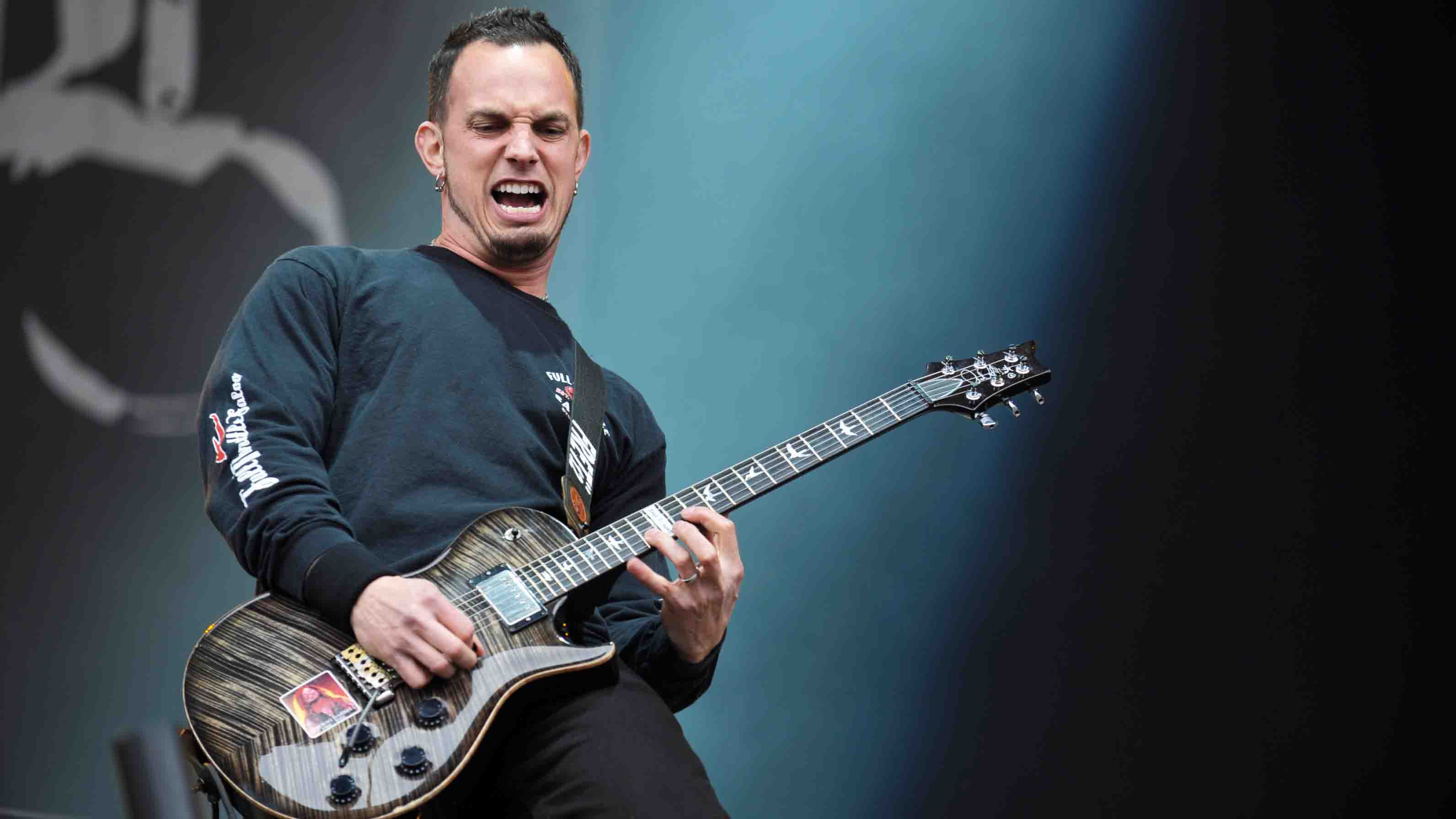
7. Losing Patience
Myles: “That was written about me from the perspective of after the Mayfield [Four] era [Myles’s band before Alter Bridge] and where I was at that point. And when I wrote the chorus, I’d had it since last year and it brought back all those [memories]. It was definitely written from the perspective of dusting yourself off and pushing forward. Like we tend to have in a lot of our songs.”
Mark: “That was one song that when we were working on it in pre-production, I liked it but didn’t love it at all. I was kind of half-hearted in it. I enjoyed playing it, but I thought, if there’s going to be B-sides on the record, this is going to be a B-side.
“But once we got it into the studio and recorded, doing vocals, I remember when I was doing my harmonised vocals and I heard Myles doing something at the end of the song. I told Elvis, ‘I absolutely love what Myles is doing on that last chorus; is there a way we can make that happen on every chorus?’ And he said absolutely. He had it going on through the entire chorus, but we changed it to the answer part with how the song is now.
In the mixing stage, it went from being one of my least favourite songs to one of my favourites
“And I think that made me love the song. In the mixing stage, it went from being one of my least favourite songs to one of my favourites. I just think that chorus is one of my favourites on the whole record.
“When we were listening to mixes, I would always go back to that song first and it was so weird for me because I was the one that really had to be pushed along to get that song done because it wasn’t something I was inspired about. But I love the way it turned out.”
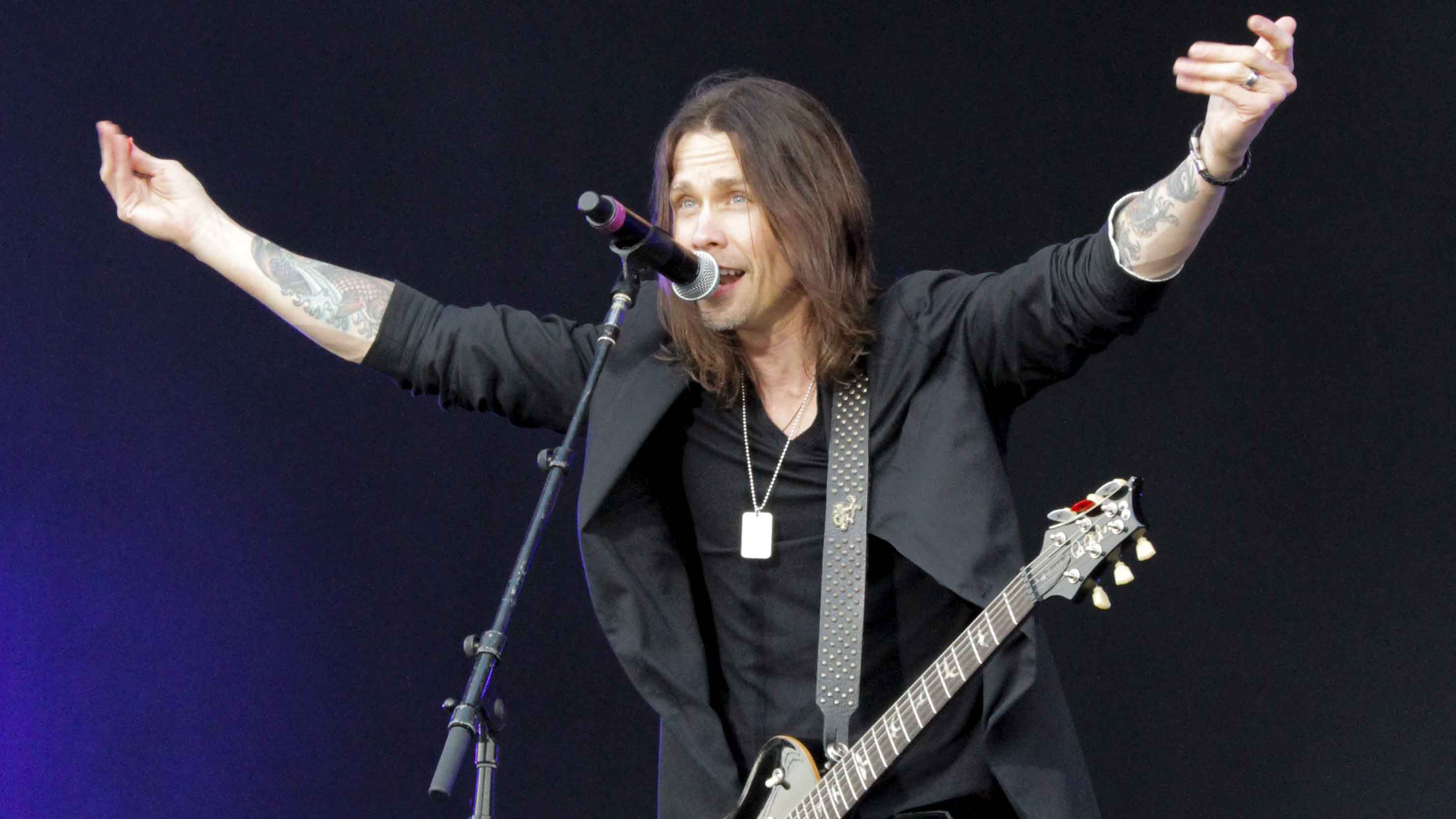
8. This Side Of Fate
Myles: “Mark had that verse and chorus, and then I had worked up this very orchestrated thing that was very Queen-inspired. But what I would have to do was change my tuning, or tweak a little thing here and there to marry it.
“But I think that was the first or second skeleton of a song that we put together, while we were Skype-ing actually. So I wrote that mid-section as a standalone part and then Mark played me his verse and chorus and it was perfect. For the solo, ultimately the inspiration was the chord tone approach, touch on the changes and have the passing tones. Just keep it as emotional as possible.”
It’s almost like there’s a trilogy between Show Me A Leader, This Side Of Fate and then it ends with The Last Hero
“It’s about living with the consequences of certain decisions you make. And for me, that song is almost a continuation of where Show Me A Leader starts. It’s almost like there’s a trilogy between Show Me A Leader, This Side Of Fate and then it ends with The Last Hero. It’s really about being at the point where you’ve made a decision and you have to live with it.”
Mark: “This Side Of Fate is the epic song of the record. The Last Hero, the last track could also be considered that style of song, but I think this song is more of the moody, deeper and more emotive kind of song. It’s probably my second favourite song on the record, next to The Other Side.
“There’s part of me that loves the emotional slower-paced epic - I don’t want to say Blackbird - but Blackbird kind of song. That’s what I think Alter Bridge does best. When I get together with these three guys, that’s what I think we’re best at. I’m really happy with that one. And the outro solo is probably my second favourite solo in the process. My favourite? That’s the B-side [see track 14].”

9. You Will Be Remembered
Myles: “We get told a lot of stories from an incredible amount of fans about their relationships with the songs. And they get tattoos with the lyrics on their bodies. It’s those fans that really remind us and keep us inspired to continue to write songs that resonate with people. It’s a wonderful feeling and it’s also a certain amount of responsibility - you don’t want to let them down. It’s a tribute to heroes, a tribute to people that sacrifice.”
Every song about loss doesn’t have to be dreary; it can be little more uplifting
Mark: “It’s a song about loss, but you’re celebrating these heroes. Every song about loss doesn’t have to be dreary; it can be little more uplifting. I remember when that song clicked. Myles played me an idea and said, ‘I don’t think this is an Alter Bridge idea, but I really like it’ so I asked him to play it for me, because I wanted to hear it. He played it and I loved it.
“It was the verse of the song, and once he started playing that I played that guitar line over the top of it [hums guitar part], and it really just filled the part out. It’s just that thing when you get two parts together and put parts together that don’t step on one another, it uplifts the idea.
“It’s like the bridge to Blackbird - when we added our parts together, it made it whole for some reason. Once we added our parts together on the verse to this song we just both lit up. It was like that Writing On The Wall moment when we took it into pre-production knowing for a fact that everybody would love this part we came up with last night.
“I had this chorus that I thought could be done really well if it was in the right song. I played it for Myles and he loved it.
“The melody used to be more sparse where it only had the answer part as the chorus. Myles put in the first line and we were talking about him sing the first line and me sing the second line, but then it was just too damn high for me to sing! I couldn’t sing it, so he just sings the whole thing. Live, we’ll just have to work it out and see what works best because I feel like a lot of these higher back-up vocals, I have to sing so loud and I don’t want to distract from what he’s doing, so I might just have to change what I’m doing instead of screaming.”
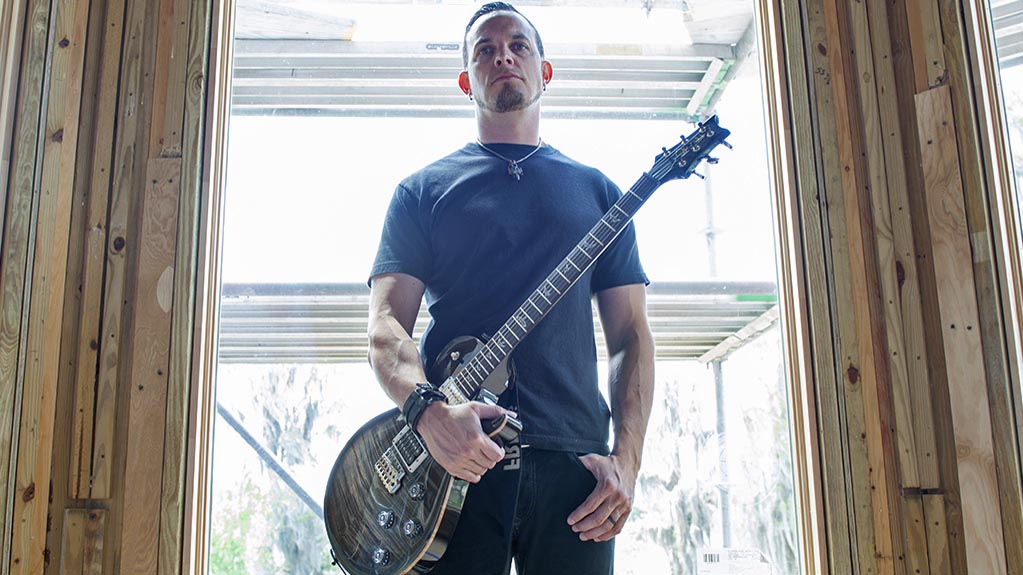
10. Crows On A Wire
Myles: “That’s definitely a Tremonti riff. It’s about how we tend to put people on pedestals and then turn around and tear them down. It is a high chorus, yes, it’s a little bit of a stretch - that will be fun to pull off live!”
Mark: “Before we got together to write, I was sending Myles ideas over the phone and it was one of the first handfuls of ideas I sent him. When we got together and we put some of the ideas together, that was another idea where Elvis was like, ‘Nope, nope, I don’t really like it; let’s do something else.’
“And everybody in the band was like, ‘Man, what’s the deal? This is a good catchy riff. This could be like an Isolation and a song our fans really like.’ And he said, ‘To be honest with you, I don’t want it to sound too close to what you do with Tremonti. It sounds more like Tremonti than it does Alter Bridge.’ And then the rest of the guys were like, no we like it - it’s not speed-metal; it’s just heavy. But he kind of had it out for it. But he wanted to keep it sounding different from Tremonti, because it’s the same producer with the two different bands. But we finally talked him into it.
“It was his least favourite song for a long time, and on every record Elvis has his least favourite song. That was his least favourite song [laughs] and he’s allowed to have that. But I think in the end he loved it!”
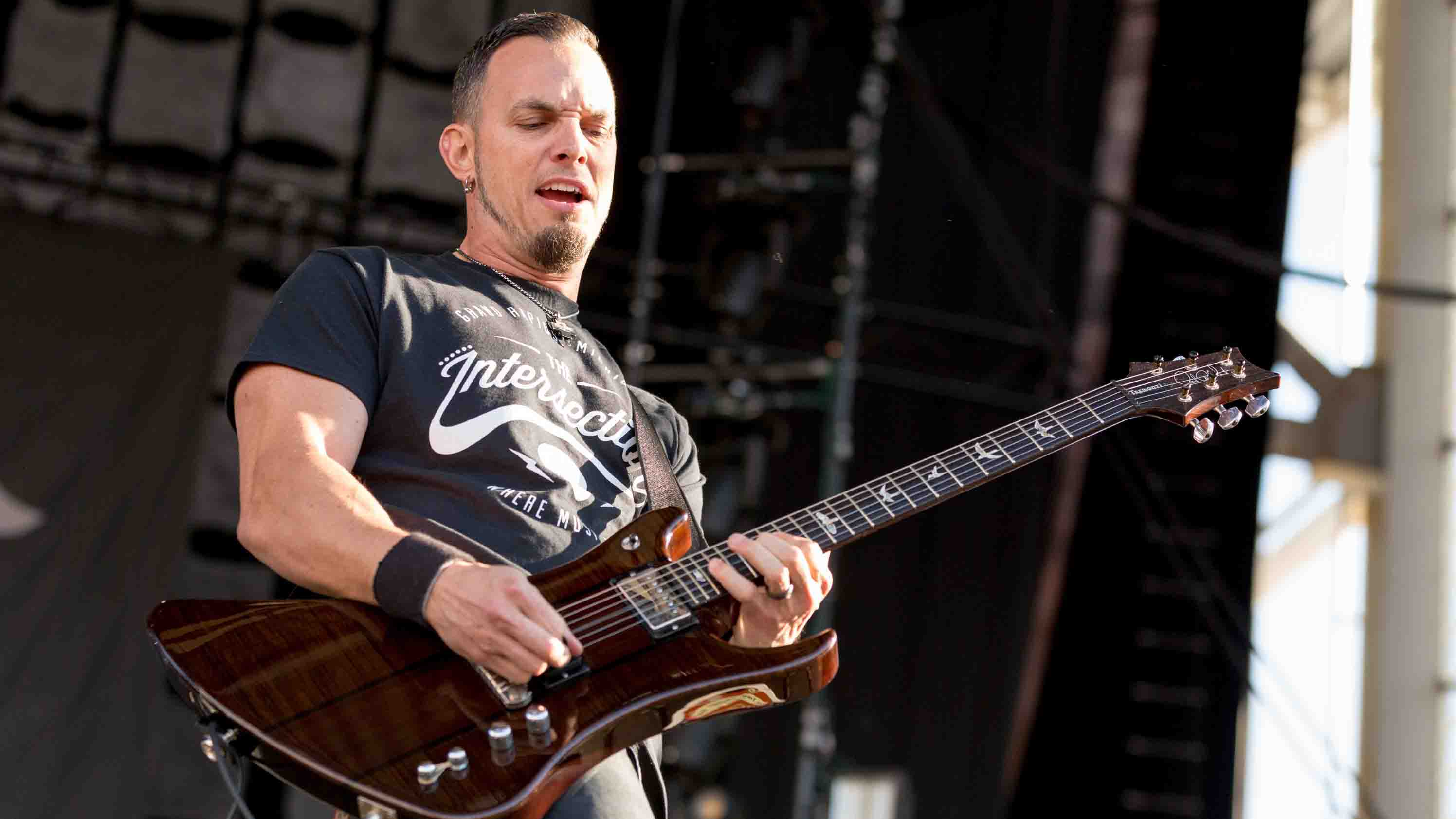
11. Twilight
Myles: “To me, that verse part is the most Pete Townshend thing I’ve ever heard Mark come up with. I like that one - that’s a cool track. That was one of the first things Mark played for me when I got to Orlando. One of the first early ideas, and I know it’s one of his favourites.”
Mark: “That is my first DADGAD [tuning] song. Very strummy, and the vocal melodies followed the guitar line - very grand and I thought it had a unique sound to it. That’s one of the songs that since we’ve started doing interviews about the record, Twilight hasn’t been a song people say really sticks out, but I hope in the long run people really dig it. Because I think it’s a unique song, and I really enjoy it.”
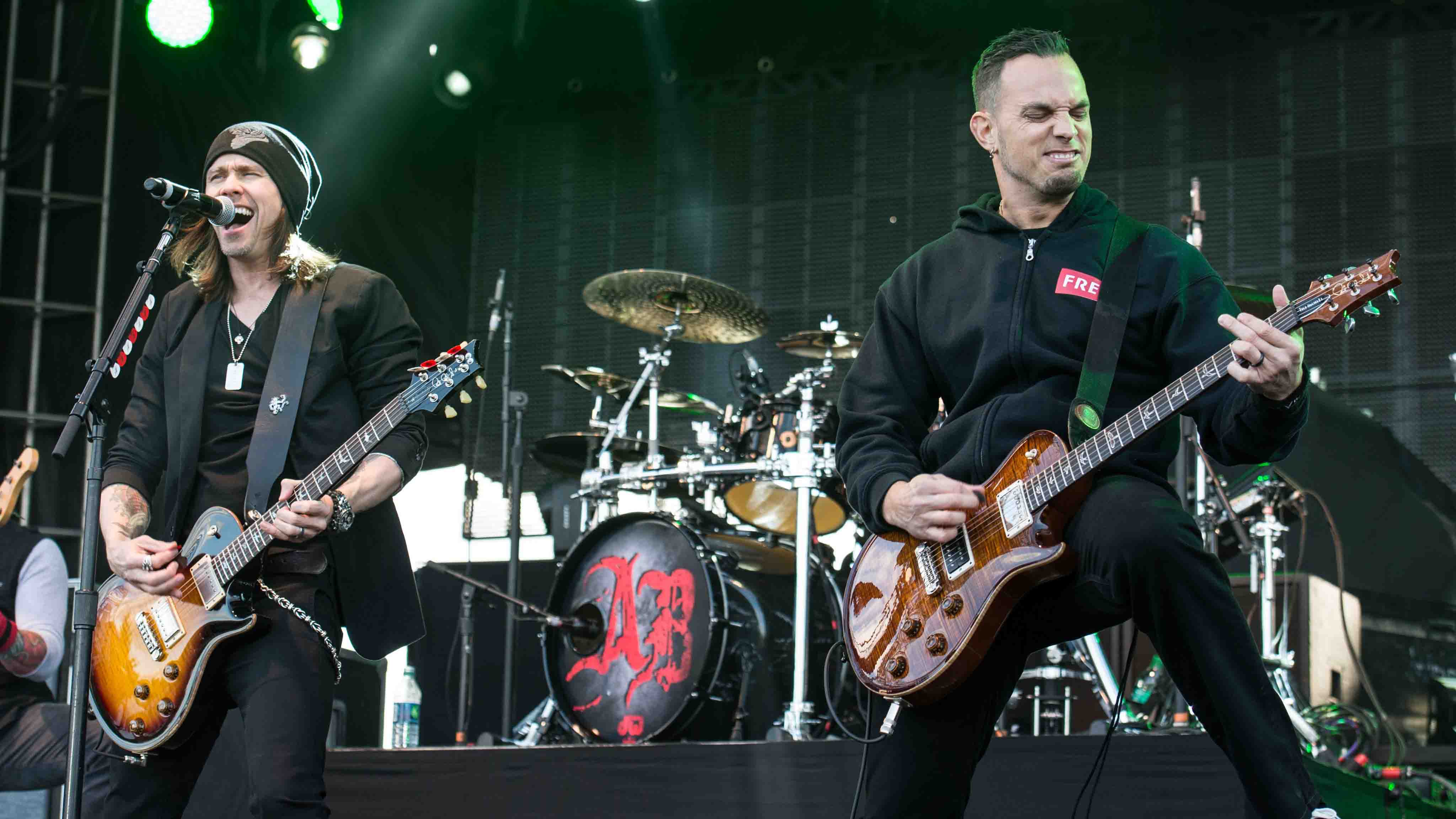
12. Island Of Fools
Myles: “That’s my very Mastodon-influenced riff. Hopefully we’ll play that one live. I play the solo before the middle eight and again, those dissonant bends… I call them irritating bug bends - if there’s a fly somewhere buzzing around you, that’s what we’re trying to recreate!”
Mark: “That was one of the heaviest Myles riffs on the whole record. The first time he played it for me, it just sounded like a machine grinding - very heavy. I think we’d tried to place it in a few different spots and finally we got it into where it sits now.
“My favourite contribution to the song is in the chorus, the rising guitar with the bent note there. I really dug how that built the chorus up.
“I think, early on, that was one of a lot of people’s favourites. At first, I thought that was going to be one of my top three favourites. It’s not, but it’s up there for me, but I had super high hopes it could have been my favourite song on the whole record when we first started putting that together.”
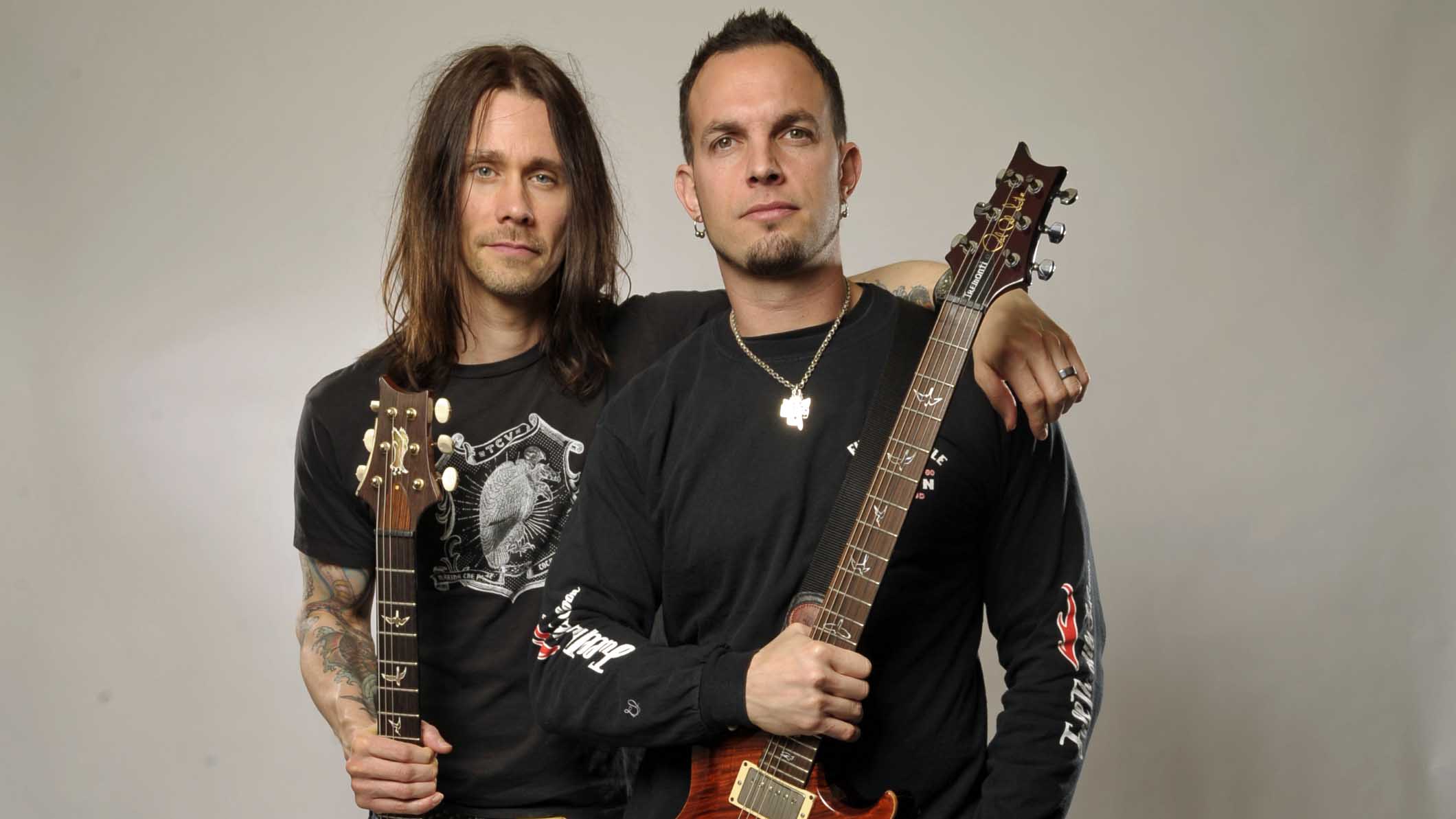
13. The Last Hero
Myles: “I guess the riff is kind of an unorthodox approach for us. Besides the middle eight, most of that I wrote in my house - the melody, that riff part… all that came in one afternoon. That was a lot that came on that one pretty quickly, and I was pretty excited about that track.
That might be my favourite solo I play on the album. It’s a real journey, and it’s going to be a real pain in the ass to play live!
“That might be my favourite solo I play on the album. It’s a real journey, and it’s going to be a real pain in the ass to play live! I was staying with Flip [Scott Phillips], our drummer, and because I was ahead of schedule with lyric writing, I’d get back, eat something after being in the studio all day and then get back to my room and just woodshed that, This Side Of Fate, the solo I did on Crows On A Wire and I’d just play them over and over. I wanted to go in there and make Elvis happy and not have him say, ‘Okay, try it again, try it again.’ I’ll give myself a B!”
Mark: “Elvis told me that this is the first album where Myles pre-wrote all his guitar solos, and you can really hear that, too, in a lot of the solos where there’s a lot of crazy technique and stuff that wouldn’t happen on the fly. Which is great because usually you hear Myles improvising these more held out singy notes with little bursts of technique here and there but these solos sound like the stuff he grew up on - the real shreddy stuff for the most part.”
“A lot of the riffage in that song is Myles’s doing. I remember being there that day, and there were two or three riffs from him and I was just trying to keep up. In pre-production, this time it wasn’t like me and Myles put that song together the night before. We did 90 per cent of the songs, but that was one of the songs that happened that day in the studio where the parts started changing so much. I’m trying to learn one Myles riff while he’s introducing another part to Elvis at the same time. I’m like, ‘Wait I’m trying to learn this riff and trying to harmonise with it and come up with my own thing.’
“I tried to put as much as I can into the song, but it’s a very complicated, long, complex song. It was one of toughest for me to perform on the rhythm side of things because Myles’s rhythm style is very different from mine, and sometimes it can be awkward for me to play, just as some of my stuff can be awkward for him to play. There’s some riffs in there that were very tough for me to get, so that’s one I’m going to have to practice a lot.”
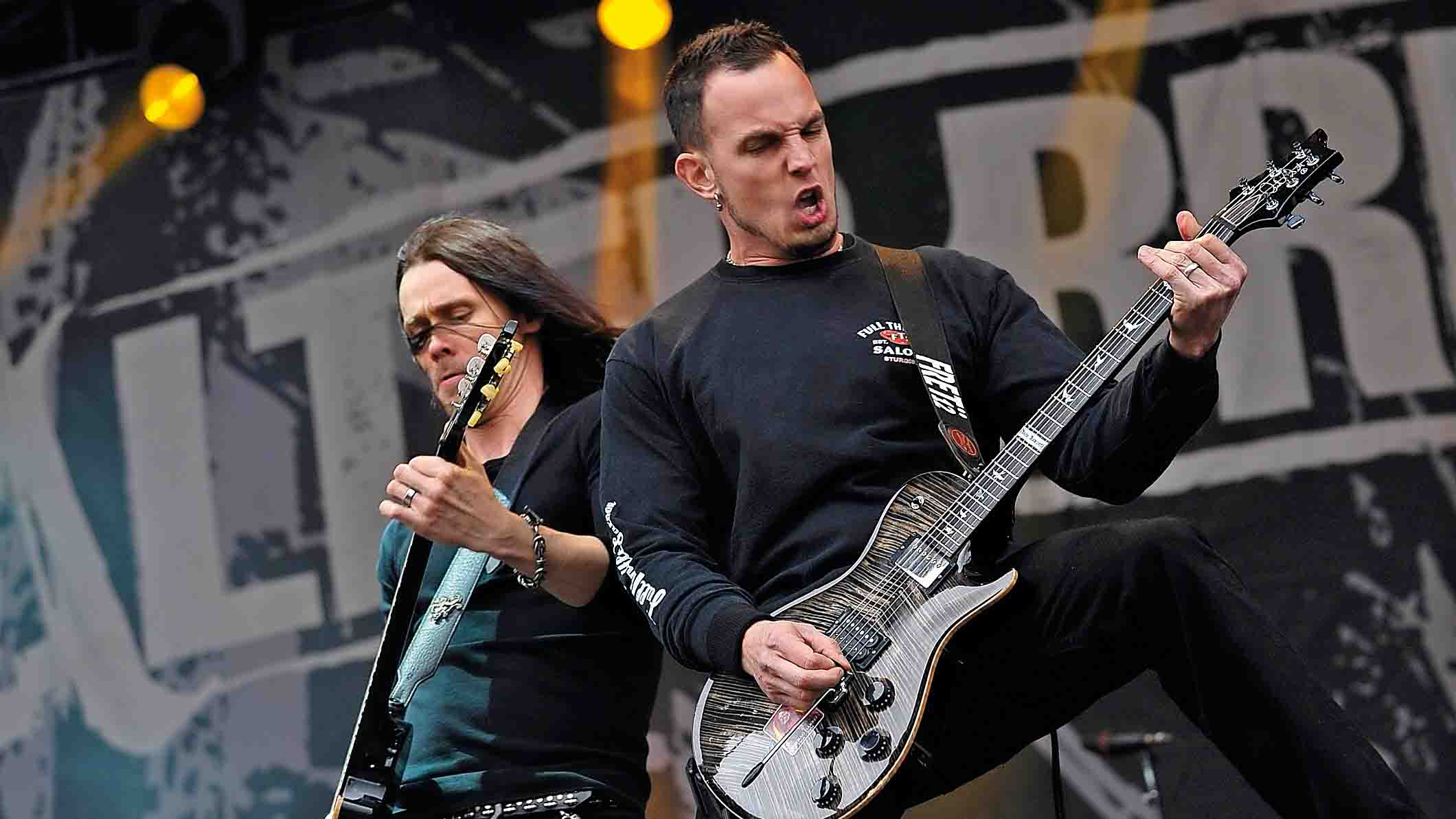
14. Last Of Our Kind (bonus song AKA Symphony Of Agony)
Myles: “I can tell you something about that song; number one, Last Of Our Kind is not the title. It was a total screw-up. And we do this with every record where there will be some sort of mishap. So, the record is technically supposed to end with The Last Hero; that’s the whole statement. But we have this additional song that made it on there… whoopee!
The song is written about being exterminated from the ants’ perspective!
“The title was actually supposed to be Symphony Of Agony. Last Of Our Kind was the original title, and then someone screwed up when it went to be pressed. So Spinal Tap. The lyric was actually inspired by when the exterminator came to our house because we had carpenter ants. And after he sprayed the house and I went up and looked at all the ants writhing around dying, I felt so bad and it broke my heart. So the song is written about being exterminated from the ants’ perspective!”
Mark: “This is the song I was so upset about. I wrote the solo and I remember my father was staying at my house while I was writing solos, and he’d say, ‘You know what, Mark, that’s fantastic,’ and I felt the same way. It was one of those solos where everything worked, and it told a story and it was really fun to perform, and then in the recording process everybody said, ‘That’s the B-side.’ My favourite solo is on everybody’s least favourite song!
My favourite solo is on everybody’s least favourite song!
“It was originally called The Last Of Us, and since everybody didn’t like the song as much and it was definitely the B-side, when I was doing my vocals me and Elvis were talking about it and I said, ‘There’s got to be hope for this song; I think the chorus just needs help.’
“So we put our heads together to come up with a different chorus, and that’s when I sang a different chorus over it and spat out lyrics on the spot. Myles came in a few hours later and we had him listen to it, and the Symphony Of Agony thing is what I sang over it, and he took it from there.
“So it’s a different melody to what was originally there, and I think we liked it a little more, but it still didn’t make the song one of the best songs on the record. It’s still one of the last-placed songs but we take pride in all of our songs. We don’t think it’s a bad song, we don’t think it’s a single or an epic track, but it does have my favourite solo on the whole record on it.”
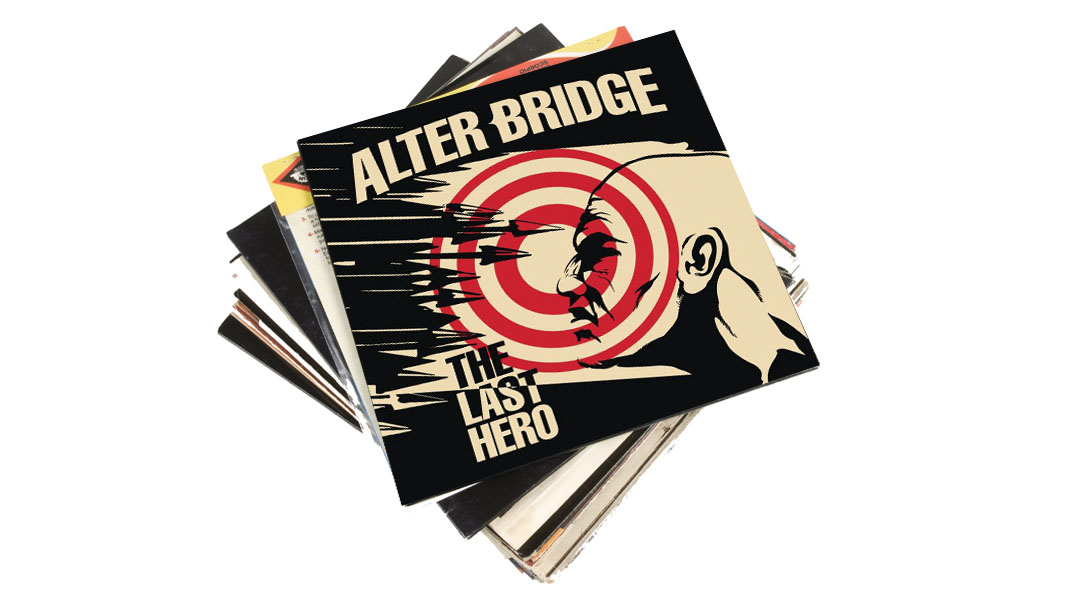
15. Breathe (US Best Buy Bonus Track)
Mark: “It was one of the One Day Remains-era songs I absolutely loved, and to be honest, I haven’t heard the version we did with Myles for years. I have my version [the original demo].
“It’s kind of a moody song… I love it. It’s heavy in its own way, but it’s definitely not fast heavy.”
Don't Miss
Mark Tremonti: the 14 records that changed my life

Rob is the Reviews Editor for GuitarWorld.com and MusicRadar guitars, so spends most of his waking hours (and beyond) thinking about and trying the latest gear while making sure our reviews team is giving you thorough and honest tests of it. He's worked for guitar mags and sites as a writer and editor for nearly 20 years but still winces at the thought of restringing anything with a Floyd Rose.